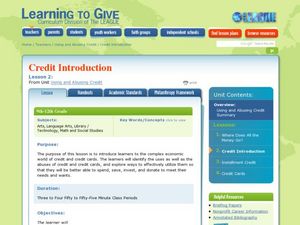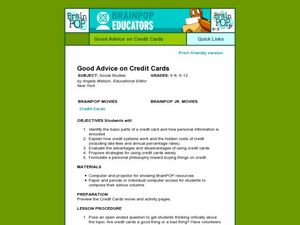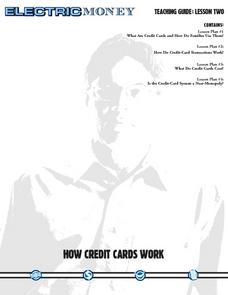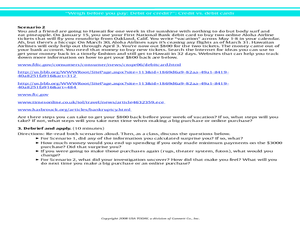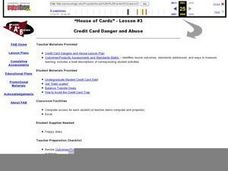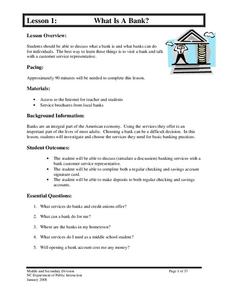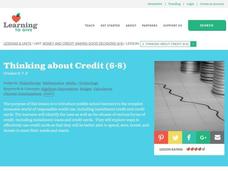Curated OER
Credit Interview
Student determine a safe debt load. In this credit interview activity, learners explore the importance of budgeting, saving and investing. They examine the pros and cons of using a credit card. Students discuss how to build credit, apply...
Federal Reserve Bank
Lesson 3: A Fresh Start
The members of your economics class may be busy earning graduation credits, but the credit they should be concerned about is their financial credit. The third lesson in a unit about Hurricane Katrina and other events that can result in...
Texas Education Agency (TEA)
Identity Theft and Credit Safety
Deter, detect, defect. Pupils watch a PowerPoint presentation and video about identity theft and credit card safety, taking notes to use later. Next, they develop a plan for maintaining credit safety and write an essay about the topic.
Curated OER
Good Advice on Credit Cards
Students study the uses of credit cards. In this life skills lesson, study discuss how credit systems work and the advantages and disadvantages of using credit cards.
Curated OER
Who Controls the Real Cost of Credit Cards?
Students view the film "How Much Does Debt Cost?" and explore the reasons why credit card fees and interest rates have gone up so much over the last 25 years. They participate in class discussion and complete a worksheet.
Federal Reserve Bank
Keep the Currency
Each day, people throw currency away in different ways because of a lack of financial knowledge. Introduce your learners to the importance of financial literacy and assess their understanding of banking and personal finance.
Curated OER
How Credit Cards Work
Young scholars discuss the nature and use of credit cards. They view a video about the role of credit cards and the whole idea of consumer credit. They examine the benefits and disadvantages to both merchants and consumers.
Practical Money Skills
Understanding Credit
Help your young consumers learn about credit and the importance of credit history. With a thorough instructional activity about the ins and outs of credit, as well as the potential pitfalls of having a line of credit, kids will be...
Texas Education Agency (TEA)
Credit Scores and Your Financial Future
How important is a credit score, anyway? Scholars view a PowerPoint and take notes about credit scores. Next, they write essays explaining their plans for achieving a good credit score.
Practical Money Skills
Using Banking Services
Using a bank is a privilege and a responsibility for young consumers. Teach them the important terms and details about creating accounts, using an ATM, and maintaining a credit card.
Curated OER
Credit - Good? Bad?
Students examine credit cards. They explore the detrimental effects that result from debt and poor credit. Students analyze interest rates, minimum balances, and consumer debt. Students survey the benefits of credit cards.
Curated OER
Weigh Before You Pay: Debit or Credit?
Students explore the concept of debit and credit cards. In this debit and credit card lesson, students read an article about debit and credit cards. Students discuss differences between the two forms of payment. Students calculate the...
Curated OER
Credit Card Danger and Abuse
Students, utilizing the computer, excel and internet, study all the downfalls of consumer debts and the complications that come with them. They assess a spreadsheet to graph their data and then present their graphs to their classmates.
Curated OER
Buying on Credit
Explore using credit in this financial responsibility and math activity. Learn to identify the acronym of "PRT" as Principle x Rate x Time, then calculate interest based on this formula. Do some real-world problem solving and choose...
PwC Financial Literacy
Credit Reports
Middle schoolers discover why it's important to establish a positive credit history and understand the value of credit reports to lenders and borrowers. They apply legal guidelines to establish the uses of a credit report other than...
Federal Reserve Bank
It's Your Paycheck
Beyond reading and arithmetic, one of the most important skills for graduating seniors to have is fiscal literacy and responsibility. Start them on the right financial track with nine lessons that focus on a variety of important personal...
Visa
The Danger of Debt: Avoiding Financial Pitfalls
How can our perspectives of borrowing and returning influence the way we view credit? Pupils explore the concept of debt, how it impacts our ability to obtain credit, and finally the ways in which we can work to alleviate debt.
Visa
Keeping Score: Why Credit Matters
How does one get credit, and who provides credit? What is a credit score, and how can an understanding of a credit score help you to make smart financial decisions? Through discussion and worksheets, class members will identify the...
North Carolina Department of Public Instruction
What Is A Bank?
You're never too young to learn about banking and personal finance. Use a set of seven banking lessons to teach middle schoolers about checking and savings accounts, interest rates, loans and credit cards, and safety deposit boxes.
Curated OER
Thinking About Credit
Learners explore the concept of credit. In this credit lesson, students discuss what it means to buy items using credit. Learners discuss how interest accrues and how much is really being paid with a credit card. Students calculate...
Curated OER
Filling Empty Pockets: Borrowing, Loans, and Credit
Students examine credit components and how each works within our economy today. For this financial literacy lesson, students explore credit terms and make decisions based on real credit card offers that they find in their on line research.
Curated OER
Number and Operation: All About Monday - Does it Pay?
Solve real-world financial math problems. High schoolers will work through a series of problems as they look at credit card interest, bill payment, and other real-world personal money matters.
Curated OER
Thinking About Credit
Students examine the use of credit such as installment purchases and credit cards. In this credit lesson, students learn the vocabulary associated with credit usage such as mortgage, credit report/score, and debit cards. They determine...
Curated OER
Pay Credit When Credit is Due
Students explore the concept of credit. In this credit lesson, students examine student organizers that focus on credit scores and credit history. Students participate in an on-line activity. Students examine credit card offers and...


